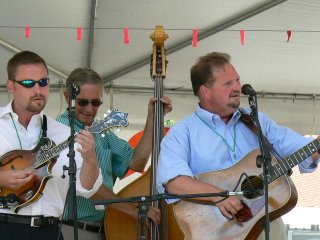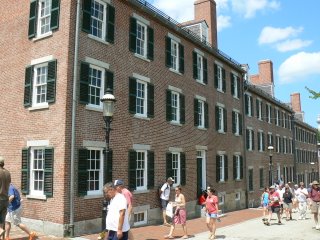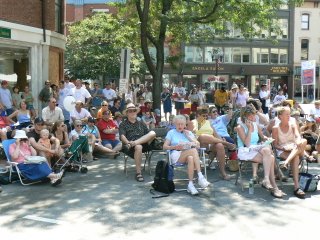
I love Lowell. It's a once grimy old cotton mill town which has dragged itself up by the bootstraps to become one of Massachusetts' most interesting tourist towns. It has added to museums and cotton industrial revolution tours, a series of festivals - most interestingly, one celebrating its most famous former resident, beat poet Jack Kerouak, and another simply the great American tradition of folk music. It was the 20th Lowell Folk Festival we attended this weekend - albeit in somewhat melting heat. This festival is big and it is free. The town closes its old flower-adorned cobbled streets and sets up stages, avenues of craft exhibitions and art shows, arrays of food vendors, a street of old-fashioned games for children, another for shops to set up bargain stalls and community groups to showcase their activities.
Sounds of music meet one wherever in the town one wanders - music Mexican, Greek, Polish, Indian, Native American, Cajun, Blues, brass - and multicultural Americana at large wanders along with one. People soup at its best.

There were power mums with high-tech uber strollers complete with cup-holders for baby bottles. Lots of them children, adored children. There is nothing wrong with the birthrate. There were rambling, extended families with dads carrying young on their shoulders. There were bare-chested, tattooed young tough guys with their jeans worn low over exposed bands of underwear - a particularly absurd fashion. But they were probably the only folk festival attendees who are worried about fashion. In the American heat, anything goes. The fatter the body, the more inappropriately skimpy the attire. I suppose that after one gets to a certain obesity, one stops checking oneself in the mirror and therefore has no idea of how appalling a tanktop and shorts looks on a 300lb figure.
As Bruce and I sat in chairs that we and a lot of others had moved from the unbearable full sun stage area to the shade of trees to listen to the Paisley brothers and their North Virginia bluegrass, I watched the passing parade with avid fascination. I was awash with the American experience, the nasal Appalachian singing, the sparkling banjo and the dazzle of folk fiddles - accompanied by strolling stream of people seeming to represent almost every possible aspect of American society. Therein, one cannot miss the tragic fatties - for they are as ubiquitous as they are immense. Often they are shamelessly fuelling up as they walk, carrying bowls of french fries or slabs of sugary fried dough. They were too huge to sit down on the frail little concert chairs so they headed for city benchs. Unsurprisingly, one sees more and more of these morbidly obese Americans riding disabled scooters.

Of course, there were myriad other hues of the cultural rainbow among the people. As at most every cultural event held anywhere, there was a strong showing of "women of a certain age" - women over 50. These are the most undervalued power of society, the great civilized and civilizing core of consumers. They exude a certain "niceness" and tend to move in small, congenial groups. We sat among a group for some time, me eavesdropping as, eagerly, they chose which acts they would see in what order and why. These middle class women, perhaps a little on the plump side, also wear shorts and t-shirts, but with belts and crisp pleats. Among them sometimes were yet older women, seniors, also in shorts. One cannot imagine grannies in shorts in Australia, but shorts are de rigueur in the US. Only the teens eschew them. They like skirts - some absurd mini skirts with flimsy halter tops, some in rather long retro frocks. Teens care about looks more than comfort.
Then, in the always moving crowd of festival goers, there were the dregs - sad waifs and strays who also have a place at a free event. Some were decidedly strange-looking. I noticed a cadaverously thin, tall African girl with a rickety, rocking gait. Some gaunt and prematurely-aged urban druggies. An odd, scraggled-haired and towering madman in a loud Hawaiin shirt. A well-dressed but obviously simple-minded man who could not stop dancing to the music, despite the oppressive heat. Then there was a seemingly quadraplegic, one-legged man simply parked in an extended wheelchair all alone under a tree, watching the world go by. How sad. Was he a relic from Iraq, I wondered. Where were his people? Such are the mysteries of other people. Everyone has a story and one yearns to be a fly on the wall of their lives - just for a moment or two.
Naturally, the American societal hues also embraced the full gamut of the diversity of ethnicity - albeit that I did not see any evidence of Islamic women. But there was plenty of evidence of blended families, always a sign of a peaceful and tolerant community.
And common across the boggling spectacle of humanity in extremis drawn together by the joy of music, there was a convivial spirit. Faces smiled and feet tapped, responding to the magic that is music, the universal language. And we, I suppose, slotted in somewhere in the cultural middle ground, just another couple strolling, smiling, looking, listening, sweating in the heat, and basking in the pleasure of the event.
folk festival
Lowell
1 comment:
delightful! let me tell you how i arrived here, on the chance it will intrigue.
as an elderblogger living in new york city, been feeling that most of my respondents live in suburbia, the country. where were the other bumptious old ladies like me? did blogsearch on google for "older urban women."
a line in your post brought me here. perhaps only someone from outside the states can write as freely as you have about our lumpy diversity, if that's what it is.
recently visited lowell, plan to write about it and tool museum in washington, maine. if you've not been there, do visit museum of work and culture in woonsocket, rhode island. it's a gem.
thanks for an uplift on a very dreary day in manhattan. i'll be back! yours, naomi
Post a Comment